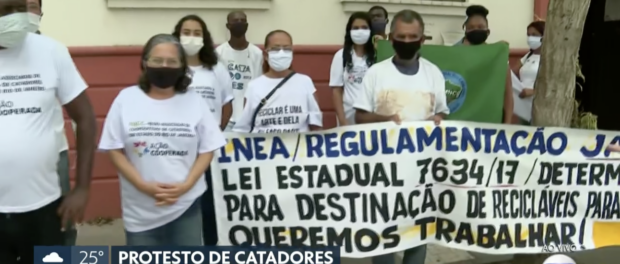
For the original article by Daniel Silveira and Larissa Schmidt in G1, click here.
A group of collectors of recyclable waste realized a protest in front of the headquarters of Rio’s State Environment Institute (Inea) downtown on September 21. They were demanding the enforcement of law n° 7,634, from 2017, which determines that large producers of solid waste in the state should prioritize the distribution of their recyclable material to associations and cooperatives of waste pickers.
Petrobras [Brazil’s government-run oil company] is reportedly among the companies that do not send the materials to the waste pickers, as required by the law. On September 18, a Rio de Janeiro court granted an injunction banning the removal of scrap material from a warehouse in Macaé which was auctioned off to a private firm in an auction organized by the oil company.
The decision, which is preliminary, responds to a request filed in civil court that same day, in which the Associated Networks of Cooperatives of Waste Pickers in the State of Rio de Janeiro questioned the legality of the auction held by Petrobras in light of the law which establishes the destination of waste.
“With this violation, Petrobras has denied the earnings potential of at least 500 waste collectors, who would have been sufficient to separate and sort the material according to destination, and who should receive this income according to law,” the group which represents the sector claimed in a court filing.
During the protest, the president of the network of waste picker cooperatives, Luiz Carlos Santiago, said in an interview with RJ1 that it is not only the federal oil company that fails to respect the law. He also stressed that, since the law was approved in 2017, the state government has not passed the regulations necessary to uphold it.
“Since 2017, we’ve been in conversation with the SEA [State Environment Secretariat], with people from Inea, and we’ve not succeeded in getting the law’s regulations issued. Companies like Petrobras, and others, auction off material which, specifically, should go to the waste collectors’ sheds,” the unionist said.
In addition to the delay in passing of regulations to uphold the law, Santiago complained about the difficulty of dialoguing with the government and with Inea who, according to him, ignore the needs of those who depend on the collection of recyclable materials in order to have a dignified income.
“All of Inea’s decisions until now only benefit those who pollute, only benefit the big [rubbish] generators. The waste pickers, as always, get left behind,” he complained.
State environment secretary Altineu Côrtes was also due to give a live interview during the protest staged by the waste collectors, but his participation was cancelled at the last minute and the secretariat decided to merely make its comments through a written statement.
In the statement, the SEA said that it held a public hearing the previous week in which it was decided that the waste pickers would be received for a conversation. In addition, the statement affirmed that the process to regulate the law was underway.
The secretariat also pointed out that some businesspeople are interested in the petroleum extraction tubes that are discarded by Petrobras and which cannot be donated, but rather sold, and that in this case the waste pickers cannot intervene, as it is an issue of free trade.

